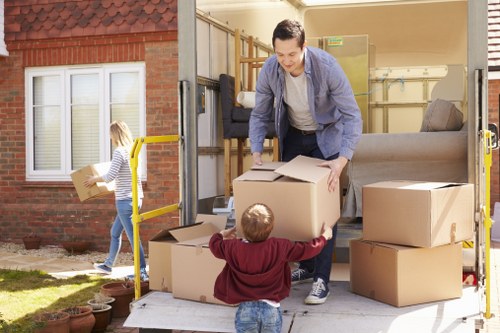Comprehensive Guide to Council Waste Collection in Central London

Managing waste in bustling Central London can be a daunting task. However, the council waste collection services are designed to make this easier for residents and businesses alike. Understanding how these services work, what can be collected, and the schedules involved is crucial for maintaining a clean and sustainable environment.
Central London encompasses some of the most vibrant and densely populated areas in the city. From historic landmarks to modern offices, the waste management needs here are diverse. The local councils have implemented robust systems to handle everything from everyday household waste to bulky items and recycling materials.
In this article, we will explore the key aspects of council waste collection in Central London, including types of waste collected, collection schedules, recycling initiatives, and tips for efficient waste management. Whether you're a resident or a business owner, this guide will provide valuable insights to help you navigate the waste collection services effectively.

Types of Waste Collected
The council waste collection system in Central London categorizes waste into several types to streamline the process. Understanding these categories can help residents sort their waste correctly, ensuring efficient collection and recycling.
Household Waste: This includes general rubbish that cannot be recycled. Items should be placed in standardized bins provided by the council.
Recyclable Materials: Recyclables such as paper, cardboard, plastics, glass, and metals are collected separately. Sorting these materials correctly is essential for effective recycling processes.

Bulky Waste Collection
Larger items like furniture, appliances, and electronics require special handling. The council offers scheduled collection services for bulky waste to prevent clutter and ensure safe disposal.
Residents can book bulk waste pickups through the council's online portal or by contacting the waste management office. It's important to adhere to the guidelines regarding what can and cannot be collected to facilitate smooth operations.
Tip: Before scheduling a bulky waste collection, check the list of eligible items and prepare them for pickup by placing them in a designated area.

Collection Schedules
Understanding the council's waste collection schedules is vital for residents to manage their waste effectively. Central London typically has specific days allocated for different types of waste, ensuring that all categories are handled efficiently.
Regular Collection: Household and recyclable waste are usually collected on a weekly basis. The exact days may vary depending on the borough.
Bulky Waste Collection: This service is often scheduled monthly or upon request. It's advisable to check the local council's website for exact timings and procedures.

Recycling Initiatives
Recycling is a key component of Central London's waste management strategy. Councils encourage residents to participate by providing clear guidelines and accessible facilities.
Many areas offer recycling centers where residents can drop off items that are not collected through regular recycling services, such as electronics, batteries, and hazardous materials.
- **Paper and Cardboard**: Ensure all paper products are clean and dry before recycling.
- **Plastics**: Only recyclable plastics should be placed in the designated bins.
- **Glass and Metals**: These materials should be separated and sorted to prevent contamination.
Local Regulations
Each borough within Central London may have specific regulations regarding waste collection. It's important to familiarize yourself with the local rules to avoid fines and ensure proper waste disposal.
Compliance includes adhering to the types of waste allowed, following the correct sorting practices, and adhering to the collection schedules.
Example: In Westminster, residents must separate recyclables from general waste and ensure that bins are placed at the curbside on the designated collection days.
Environmental Impact
Effective waste management has a significant impact on the environment. Proper collection and recycling reduce landfill usage, lower greenhouse gas emissions, and conserve natural resources.
Central London's commitment to sustainable waste practices contributes to the city's overall environmental goals, promoting a cleaner and healthier urban environment.
- **Reduction in Landfill Use**: Recycling minimizes the amount of waste sent to landfills.
- **Energy Conservation**: Recycling materials like aluminum and glass requires less energy compared to producing them from raw materials.
- **Pollution Control**: Proper waste disposal reduces pollution and protects local ecosystems.
Tips for Efficient Waste Management
Residents and businesses can take several steps to manage waste more efficiently, contributing to the overall effectiveness of council waste collection services.
Sort Your Waste: Properly separating recyclables from general waste ensures that materials are processed correctly.
Reduce and Reuse: Minimizing waste production and reusing items can significantly lower the volume of waste that needs to be collected.
Proper Disposal of Hazardous Waste
Hazardous waste, such as chemicals, batteries, and electronics, requires special disposal methods to prevent environmental damage.
The council provides specific guidelines and facilities for the safe disposal of these materials. Residents should never place hazardous waste in regular bins to avoid contamination and legal issues.
Reminder: Always check the council's website for information on hazardous waste drop-off points and scheduled collection events.
10 Closest Areas to Central London for Council Waste Collection
Central London is surrounded by several key areas that rely on similar council waste collection services. Below are the ten closest areas, each with unique features that influence their waste management needs.
- Westminster: Home to iconic landmarks like the Houses of Parliament and Buckingham Palace, Westminster has high foot traffic and considerable waste generation.
- Kensington and Chelsea: Known for upscale residences and tourist attractions, this area emphasizes recycling and managing high volumes of recyclable materials.
- Camden: With its vibrant markets and cultural spots, Camden requires efficient waste collection to handle both residential and commercial waste.
- Islington: A mix of residential and business districts, Islington focuses on segregating waste to support its sustainability initiatives.
- Southwark: Located along the River Thames, Southwark manages waste collection in both densely populated and industrial zones.
- Lambeth: Featuring diverse communities and significant commercial areas, Lambeth prioritizes effective waste sorting and recycling programs.
- Greenwich: With its historical sites and residential areas, Greenwich balances waste collection between tourism-driven and household needs.
- Hackney: Known for its artistic communities and bustling nightlife, Hackney emphasizes timely waste collection to maintain cleanliness.
- Hammersmith and Fulham: A blend of residential and business districts, this area focuses on managing waste from both sectors efficiently.
- City of London: The financial hub requires meticulous waste management due to high business activity and limited residential spaces.
Unique Waste Management Features
Each of these areas has specific waste management features tailored to their unique environments. For instance, tourist-heavy areas like Westminster and Greenwich have increased waste collection during peak seasons to accommodate the influx of visitors.
Residential areas such as Islington and Kensington prioritize recycling and minimizing general waste, while commercial zones like the City of London focus on efficient waste handling to support numerous businesses.
Innovations: Some areas have introduced smart bin systems and mobile apps to enhance waste collection efficiency and provide residents with real-time updates.
Challenges in Council Waste Collection
Despite well-structured systems, Central London faces several challenges in waste collection. High population density, varying waste generation rates, and the need for advanced recycling technologies are some of the hurdles councils must overcome.
Population Density: The sheer number of residents and businesses in Central London increases the volume of waste, putting pressure on collection schedules and resources.
Recycling Contamination: Improper sorting of recyclables can lead to contamination, making it harder to process and recycle materials effectively.
Solutions and Improvements
To address these challenges, councils are implementing various strategies. These include public education campaigns to improve waste sorting, investing in more efficient collection vehicles, and expanding recycling facilities.
Technological advancements, such as automated sorting systems and data-driven collection routes, are also being adopted to enhance the efficiency and effectiveness of waste management services.
Future Outlook: Continued investment in sustainable waste practices and community engagement will be key to overcoming current challenges and improving overall waste management in Central London.
How to Get Involved
Residents and businesses can play a vital role in enhancing council waste collection services. By participating actively and following guidelines, the community can contribute to a cleaner and more sustainable Central London.
Volunteer Programs: Joining local clean-up initiatives and recycling drives can significantly impact waste reduction efforts.
Feedback and Suggestions: Providing feedback to the council about waste collection services can help identify areas for improvement and innovation.
Educational Resources
The council offers various resources to educate the public about proper waste management. These include online guides, workshops, and informational pamphlets available at community centers.
Staying informed about the latest waste collection policies and best practices ensures that residents and businesses remain compliant and efficient in their waste disposal habits.
Engage: Attend council meetings or participate in surveys to stay involved in local waste management decisions.
Conclusion
Effective council waste collection in Central London is essential for maintaining the city's cleanliness and sustainability. By understanding the types of waste collected, adhering to schedules, and participating in recycling initiatives, residents and businesses can contribute to a healthier urban environment.
While challenges exist, ongoing improvements and community involvement are paving the way for a more efficient and eco-friendly waste management system. Embracing these practices not only benefits Central London but also sets a positive example for other urban areas.
Remember, every effort counts. Proper waste management is a collective responsibility that ensures a better future for all.
Frequently Asked Questions
1. How do I find out my waste collection schedule in Central London?
You can visit your local council's website or contact their waste management office. Most councils provide an online tool where you can enter your postcode to view your specific collection days.
2. What items are not accepted in regular waste collection?
Items such as hazardous waste, electronics, batteries, and bulky items are not accepted in regular waste collection. These items require special disposal methods and should be taken to designated recycling centers or scheduled for bulk pickup.
3. How can I reduce the amount of waste I produce?
Focus on reducing single-use items, reusing products where possible, and recycling materials correctly. Composting organic waste and opting for products with minimal packaging also help lower waste production.
4. What should I do if my waste bin is overflowing?
You should contact your local council to report the issue. In the meantime, try to manage the waste by temporarily storing it safely until the next collection day.
5. Are there penalties for not following waste collection guidelines?
Yes, councils may impose fines or penalties for improper waste disposal, such as not sorting recyclables correctly or placing waste out of collection times. It's important to adhere to the guidelines to avoid such penalties.